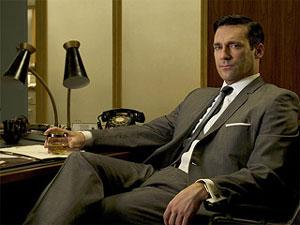Style and “Mad Men”
The following is not a full transcript; for full story, listen to audio.
In the movies these days, the hero tends to be a guy who is in some kind of perpetual adolescence. Either that, or a vampire, but we won’t get into that.
With movies like “The 40-Year-Old Virgin,” “Knocked Up,” and “Funny People,” that character is usually played by Seth Rogen. So, how do we explain this new archetype men are glomming onto? He can be found on the AMC television series “Mad Men.” It is set in the early 1960s, and the lead character, Don Draper, is an old-fashioned, square-jawed, hard-living advertising executive. To many, he represents a version of masculinity a lot of guys today never knew.
Don Draper. Seth Rogen. They are like opposite ends of a post-modern manliness spectrum. However, some of Don Draper’s biggest fans are very Seth Rogen-kind-of-guys.
Our example is a gentleman from the Bay Area, Neil Scapora. He says, “Dude,” all of the time. But when he watches “Mad Men,” he wishes that he could wear a suit to work.
“Dude, I don’t have the function for it. That is the bummer. In California, so few people really have a calling to actually wear a formalized suit.”
Neil is being modest. His boss instituted a dress code for the whole office just because Neil wore shabby T-shirts. He started wearing collared shirts, but they are always a little subversive, like having a rat instead of an alligator. What if Don Draper was his boss?
“He probably would have beaten me in the alley. I would have been an affront to his manhood.”
A blog has even sprouted titled “What Would Don Draper Do?”
“Well, you would want advice from this man who seems annointed,” says Michael Dempster, the blog’s creator. It is a side project — in his day job, he writes for Howard Stern, who is about as far from Don Draper as you can get. The blog is much cleaner than what he supplies Mr. Stern; it works more like a Dear Abby column. People submit questions, and Dempster does his best to channel Draper.
Matt Callicott is another Don Draper fan. He is jealous of Don’s sense of privacy, something we’ve lost today.
“There isn’t much mystery in this day and age. Most people can find out just about anything about you by going on Google.”
Matt does PR for internet companies. He says that today, there is no way that Don could be so secretive, and maintain a professional relationship.
“He would have to be out all of the time; he would have to be on Twitter, commenting on industry trends and issues; he’d have to do all sorts of things that going out and sitting in a bar just really wouldn’t do for him.”
Michael Kimball, a sociologist, doesn’t think that fans of the show want to go back to a time when white men held power through racism or sexism. Those born after 1970 are, however, seeing something very appealing in the workplace of the early 1960s.
In Don Draper’s world, security, status and stability are easy to obtain. If Don wants to, he could stay at Sterling Cooper for his entire career.
“The guys in ‘Mad Men’ have an idea of what they want by the time they are 30, by the time they are 40. You could ask them. Seth Rogen, he couldn’t tell you where he is going to be next week.”
Kimball interviewed hundreds of young men for his book, “Guyland.” They are a lot like Judd Apatow characters. They have big dreams to be a filmmaker, or an internet mogul, but they are just not sure how to get there.
“The economy makes you so anxious. It is so tenuous. Any hold you might have can be taken away in an instant.”
So, they go from job to job waiting for their big break. They are not boys anymore, but they will never be men in grey flannel suits.
“They are living with a level of anxiety that Don Draper never had to face. That is an infantilizing situation. That is, we are putting them in a situation where it is hard to be grown-ups, and then saying, ‘Okay, be grown-ups.'”
PRI’s Peabody Award-winning “Studio 360 with Kurt Andersen” from WNYC is public radio’s smart and surprising guide to what’s happening in pop culture and the arts. Each week, Kurt Andersen introduces you to the people who are creating and shaping our culture. Life is busy — so let “Studio 360” steer you to the must-see movie this weekend, the next book for your nightstand, or the song that will change your life.
